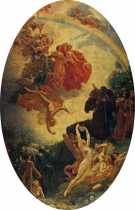
What of the Many Gods? Are they really all One? Are they distinct individuals? Is it the same deity in many cultures? We continue our development of a Pagan Systematic Theology by addressing the Gods Themselves and some thoughts on how to think about our work with Them.
One of the really great questions humans have been working on for literally ages is “Is the World One or Many? You can find a long tour of this process in McEvilley’s “The Shape of Ancient Thought” [The kindle edition is cheap!]. We can see even in stone age mythologies efforts to express the general intuition humans have of the unity of the world.
Philosophically this is called ‘monism’ and all the great religions that develop deep self-critical literature have some form of this stance. The One of the Neoplatonists, the Tao, Shunyata for the Buddhists, are all very different ways of apprehending that unity. It is possible to confuse monism with monotheism as some scholars are doing today. (See Athanassiadi’s "Pagan Monotheism in Late Antiquity".) But as soon as you have other Deities in the system, as did the ancient Neoplatonists, it can’t be monotheism, which is specifically the rejection of all deities, except one. Indeed, in the ancient world Christians were considered and referred to as ‘atheists’ because they denied the Gods.
We discussed the world from the viewpoint of its simplicity and unity in my last blog-post, now we need to turn to its divine multiplicity. Gnosis published an early effort of mine on this subject in 1993 (What is Polytheism and how I became Polytheistic). Those were not bad ideas, but I would like to take a different tack today. . .
-
 A couple of thoughts on your proposed structure here: First, I'm not sure that your chain of progression here accurately represen
A couple of thoughts on your proposed structure here: First, I'm not sure that your chain of progression here accurately represen -
 Scott, Thank you for your comments. There are a variety of understandings about the nature of the Henads. My interpretation is fa
Scott, Thank you for your comments. There are a variety of understandings about the nature of the Henads. My interpretation is fa
















